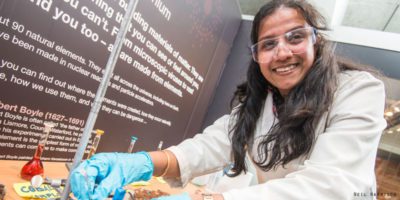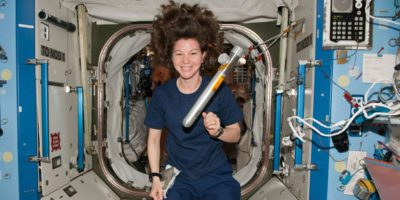Dr. Laura Wilkinson is a lecturer in psychology at Swansea University, where her research focuses on the psychology of eating behaviour. She is interested in how variety in our eating environment affects our eating patterns. She also has an ongoing interest in how some individuals regulate their emotions using food. Her specialist areas of expertise include eating behaviour and obesity.

Laura spoke at the Swansea Soapbox Science event on Saturday 6th June 2015. The title of her talk was: “Why do I always have room for dessert? How the variety effect shapes our everyday decisions about meals and snacks.”
Psychology: Using an empirical approach to understand human behavior was extremely attractive

I became interested in psychology at Sixth Form College when, for me and many others, this subject was offered for the first time. I had always been extremely interested in science subjects and the notion of a subject that uses an empirical approach to understand human behaviour was extremely attractive.
I went on to complete a degree in Experimental Psychology at the University of Bristol. In my final year of undergraduate study I had the opportunity to conduct a research project with Professor Jeff Brunstrom, who specialises in behavioural nutrition.
Intrigued by how quickly our eating environment has been changing in the last 50 years
I was initially attracted to working on a project in this area because I had read lots of newspaper and magazine articles about ‘the obesity epidemic’, junk food in our supermarkets etc. and was (and still am) intrigued by how quickly our eating environment and eating behaviour has been changing over the last 50 years.
An unmissable opportunity: To see first-hand the impact well conducted and focused research can have on people’s everyday lives
I went on to complete a research internship at Nestlé Research Centre in Lausanne Switzerland before returning to the University of Bristol to conduct my Ph.D. [Doctor of Philosophy] in Behavioural Nutrition. Following my Ph.D., I had the unmissable opportunity to conduct research in a third sector organisation that focuses on domestic violence. That position enormously broadened my understanding of conducting research outside of the laboratory and under very difficult circumstances.
More importantly, it allowed me to see first-hand the impact that well conducted and focused research can have on people’s everyday lives (through improvement to service provision available to victims). During this time I also became considerably more aware of when victims of domestic violence develop disordered eating. This is an area I hope to be able to understand more through future research.
Understanding fundamental drivers of eating behaviour underpinning approaches to treatment
When thinking about helping people by preventing obesity and / or forms of disordered eating it is important to conduct research investigating the efficacy of potential treatments but it is also important to conduct research which aims to understand the fundamental drivers of eating behaviour.
This is because our understanding of the latter underpins approaches to treatment. My research thus far would come under the category of fundamental drivers of eating behaviour that may inform potential approaches to obesity prevention of the future.
Research: Participants tasting, eating and rating a range of food under a range of circumstances which are being systematically manipulated!
I am a new lecturer in psychology and am currently working on establishing my research portfolio here at Swansea University. I tend to conduct quantitative experimental research in the laboratory. This often involves participants tasting, eating and rating a range of foods under a range of circumstances which are being systematically manipulated!
Psychology – less male dominated at undergraduate level but comparatively more male dominated at faculty level. Why?
In terms of gender domination, psychology is a really interesting example because at undergraduate level it tends to be female dominated. When I was an undergraduate out of around 100 students I think there were only four or five men. However, when you then take a look at faculties and further to individuals with the position of Professor, you see a very different story – so what happens in the interim?
This is something that many people are working on and is behind initiatives such as Athena Swan. So, compared to other sciences at undergraduate level I have the impression that it is considerably less male dominated than other areas of science but by the time you reach faculty level it becomes comparably male dominated.
Why I applied for Soapbox Science
I applied for Soap Box Science for a number of reasons; 1. I think it is really important to discuss eating behaviour with the public because there is so much conflicting material available to people 2. I love the idea of changing peoples’ perception of what a scientist looks like – especially with regard to gender 3. I am new to Swansea and Soapbox Science Swansea will be a fantastic opportunity to meet members of the local community and talk about science!
A bit of what you fancy..?

In this respect food might represent a bit of a special case because, of course, we cannot give up food altogether like other things individuals might rely on for emotion management. Importantly, if you feel your comfort eating is becoming a major issue for you then you should see your GP.
Generally, if you are looking to reduce intake of high fat high sugar foods then there is evidence that suggests it may help to choose foods which have low variety (e.g., chocolate that does not contain raisins and marshmallows and peanuts and bits of toffee) because processes which take place as we are eating that help us to end a meal (sensory specific satiety) will develop more slowly and you will end up eating more.
In addition, there is some evidence to suggest that eating foods which have a more intense flavor may promote sensory specific satiety leading you to eat less. I will be talking about these types of effects during my Soapbox Science talk.
Preparation…at the supermarket
The first thing I did to prepare for my session was think about my props and this involved going round the supermarket looking for food products which vary in terms of variety. This has recently become a lot easier because there is a trend for products such as ‘sweet and salty’ popcorn and salted caramel chocolate. These types of products slow down the processes which help bring an end to a meal and so you may end up consuming more of these foods.
When it comes to popcorn this may not matter as it is often fairly low energy density, but for salted caramel chocolate that is high energy density this may be different. I am also keeping an eye on the newspapers and magazines for hot topics in the area of eating behaviour as people may have questions that relate to the science behind the story.
Finally, I am practicing what I am going to say with family and friends – who seem to have lots of opinions on the subject!
Strong opinions about eating behaviour
I think I can engage my audience using quite a bit of audience participation because many people hold strong opinions about eating behaviour. So, I am going to do some voting about what people believe about food and diet and then discuss the science behind that belief. I am also going to do some games which involve picking the foods that they think would increase and decrease consumption.
In no more than three words, what to expect from my Soapbox Science session:
The three words which I would use to describe my session are applicable, interactive and popcorntastic! You can find full details of the event here. It is free and it’s open to all.
http://www.swansea.ac.uk/staff/human-and-health-sciences/psychology/l.l.wilkinson/
https://twitter.com/llwswansea
https://twitter.com/swanseauni
https://uk.linkedin.com/pub/laura-wilkinson/63/530/a45





